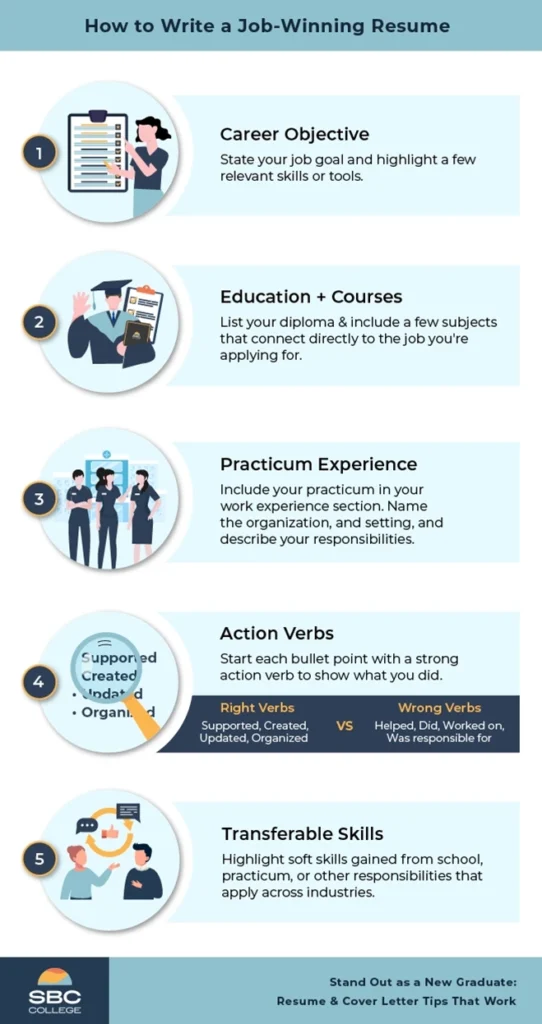Table of Contents
You’ve decided on your career and started building the skills for it through your diploma program. With your practicum placement lined up and graduation approaching, it’s time to focus on landing your first job.
A compelling resume and cover letter can make the difference between being overlooked and getting that sought-after interview call.
Here’s how to strengthen your job application and how SBC College supports your job prep through career-focused training, resume support, and mock interviews.
Listen to: Stand Out as a New Graduate: Resume & Cover Letter Tips That Work
Resume Writing Strategies for New Graduates
Writing your first resume after graduation can feel daunting. You may wonder how to compete with others who have more experience.
The key is to personalize your resume for each role. This means adjusting it slightly for every job application by highlighting the parts of your education, practicum, and strengths that relate to what the employer is looking for.
Here’s how to tailor each section of your student resume so it connects with the job position and shows you’re ready for the workplace.
Craft a Focused Career Objective
Start your resume with a short statement that names the position you’re aiming for and includes a few relevant tools or strengths.
Here are a few examples of career objectives:
For Legal Assistant
“Graduate applying for a Legal Assistant position, with training in legal procedures, legal research, and office software. Prepared to support case preparation and documentation in a law office.”
For Medical Office Administration
“Graduate pursuing a Medical Office Administrator role, with hands-on experience in clinic scheduling systems, patient records, and appointment coordination.”
For Graphic Designer
“Graduate seeking a Junior Graphic Designer position, with skills in Adobe Creative Cloud, layout design, and branding, ready to contribute to a visual communication team.”
This opening line sets the tone for the rest of your resume by making your goals and strengths clear.
Highlight Your Education and Key Courses
After your career objective, use the education section to highlight the value of your diploma program.
If you’re a student or graduate of an SBC College diploma program, include two or three course subjects that relate directly to the position.
For example:
Personal Care Aide graduates might include Mealtime Assistance Training, Transferring, Lifting and Repositioning, or Medical Terminology and Anatomy to point to their preparation for client support and physical care.
Accounting, Tax, and Payroll graduates can list Computerized Bookkeeping – Quickbooks, Payroll Applications, or Personal Income Tax Preparation to highlight their experience with accounting software and compliance standards.
Course examples give context to your education and show employers how your background matches the job.
Feature Practicum Experience
If your diploma program included a practicum, list it in your work experience. Treat it like a job: name the organization, describe your role.
Example:
Education Assistant Practicum – Valley Creek Elementary School
Guided students through reading and math activities, adjusted support based on learning needs, and worked with the teacher to maintain daily routines.
This gives employers an idea of how you’ve applied your training in a professional setting.
Use Strong, Action-Oriented Language
Start every bullet point in your resume with strong verbs that reflect your involvement.
For example:
- Prepared invoices using accounting software and submitted them for review
- Responded to appointment requests and updated patient records in clinic software
Action verbs make your previous responsibilities easier to understand and emphasize your involvement.
Showcase Transferable and Soft Skills

Even without formal experience, you’ve likely developed transferable skills that apply across industries.
For example:
- Balancing studies with full-time work or caregiving reflects good time management and commitment
- Assisting peers with assignments demonstrates initiative, collaboration, and communication
- Completing a practicum in a workplace builds adaptability and a professional mindset
You can reflect these skills in your resume through how you describe your diploma program, practicum, or specific coursework. Use action-based bullet points to show how you worked with others, stayed organized, or met expectations in professional settings.
The different sections of your resume work together to tell your story. Your career objective introduces the role you’re aiming for and the strengths you bring. Your courses and practicum show what you’ve learned in your program. Action verbs and transferable skills help illustrate how you’ll contribute to their workplace.
When it all aligns, your resume reflects your job readiness and helps employers see your true potential.

Cover Letter Tips for Recent Graduates
If your resume is a snapshot of your background, your cover letter adds context to it. It lets you explain what you’ve learned, why the job interests you, and how your background fits the role. For a new graduate, it’s a chance to introduce yourself in a more personal and direct way.
Personalize Your Greeting to the Hiring Manager
Always begin your cover letter with a professional greeting. If the posting lists a contact, use their name (e.g., “Dear Jordan Chen”). If not, use something role-specific like “Dear Hiring Manager” or “Dear Accounting Team.”
If someone referred you, mention it early on. A simple line like “Wenda Ellis encouraged me to apply to your team” can help you stand out.
Demonstrate Your Fit—Even with Limited Experience
Once your greeting is in place, introduce yourself with a sentence that states the position you’re applying for and where you found the posting. Follow with a brief mention of what drew you to the role. To make a good impression, refer to two or three responsibilities from the job posting that match your practicum or course experience. This shows the hiring manager that you’ve read the posting carefully and understand what the role involves.
Example:
I’m applying for the Legal Assistant position posted on your website. After completing my Legal Assistant diploma and gaining hands-on experience preparing client files, drafting correspondence, and organizing case documents during my practicum at Neil & Co., I saw a strong match between those responsibilities and the ones outlined in your posting. I’m confident I can support your legal team with day-to-day case management and documentation.
For a new grad writing an entry-level cover letter, this kind of introduction highlights your job fit right away and encourages hiring managers to keep reading.
Connect Academic Projects to the Job Requirements
Support your introduction by mentioning one or two experiences that relate directly to the job you’re applying for. Focus on what you did, how you contributed, or what tools you used during your diploma program or practicum work.
Example: During my Network Systems Administrator diploma program, I completed courses like Network+ and Microsoft Endpoint Administration, where I learned how to configure networks, manage Windows devices, and support users in a desktop environment. These skills closely match the technical requirements listed in your posting.
Sharing relevant academic projects or coursework helps employers see the job relevance of your diploma.
Show Enthusiasm and Willingness to Learn
Employers know that recent graduates may not have much workplace experience yet. What often matters is your motivation. Use this part of your letter to explain what draws you to the organization and how you’re ready to apply your training in a new setting.
Example:
I’ve followed your clinic’s work in community health and appreciate the focus on accessible care. I’m excited to bring my training in electronic medical records and appointment coordination to a team that shares those values.
Having a sentence like this shows that you’re not only prepared to start the job but genuinely interested in how your work connects to the employer’s goals.
End with a Confident Closing and Call to Action
Thank the employer and express your interest in continuing the conversation. This is a good place to include your contact details again.
Example:
Thank you for reviewing my application. I’d appreciate the opportunity to speak more about how I can support your team and contribute to a positive work environment. I can be reached at 555 123 4567 or alex.taylor@email.com.
Your cover letter lets you speak directly to the employer and explain how your diploma program, practicum work, and interest in the field align with their needs. By including relevant examples, keeping a professional tone, and showing you’re ready to learn, you can make a strong impression.
How SBC College Helps You Launch Your Career
Every diploma program at SBC College is designed to prepare you for the workforce. Whether you’re completing a diploma program as a legal assistant, personal care aide, graphic design specialist, or administrative assistant, your courses reflect the education employers look for.
Each program includes a practicum, giving you experience you can list on your resume. You’ll also have access to a professional Career Services team, including workshops on resume writing, interview prep, and job search strategy.
Tim H., Assistant Education Manager, Career Services, SBC College, says the support starts early and continues through graduation:
“We conduct a career management class three times a week for every program. It sets students up with the foundations of creating a strong resume, a good cover letter, and prepares them for interviews.
Then, as they near graduation, we reinforce those skills with one-on-one coaching.”
It’s this steady guidance that helps students feel prepared when it’s time to apply for jobs.
By combining career-focused training with hands-on experience, SBC diploma programs give you the skills and experience to back up your resume and make your cover letter more compelling.
To learn more, contact an admissions advisor today.
FAQs
How can I write a resume with no work experience?
You can list your practicum experience as a job. Include where you worked, what you did, and tools or systems you used (e.g., EMR software, QuickBooks, administrative procedures).
What sections are essential on a new graduate resume?
Career objective, education, practicum, relevant coursework, and skills tied to the job such as Microsoft Office software, industry terminology, or professional communication.
Can I add school projects or group work to my resume?
Yes. Add one or two academic projects that relate directly to the job. For example: “Planned and promoted the Annual SBC Business Show as part of Executive Assistant training, coordinating with peers, vendors, and instructors to manage logistics and presentations.”
How should I explain a gap in my education or work history?
Briefly mention it in your cover letter. For example: “During [timeframe], I paused my studies to care for a family member and have since returned to complete my diploma.”
What makes a cover letter stand out for entry-level jobs?
For new graduates, a standout cover letter starts by naming the job you’re applying for. It then highlights one or two examples from your practicum or coursework that match the responsibilities listed in the posting. Finally, it explains why you’re interested in the company and how you’re ready to contribute in the role.






